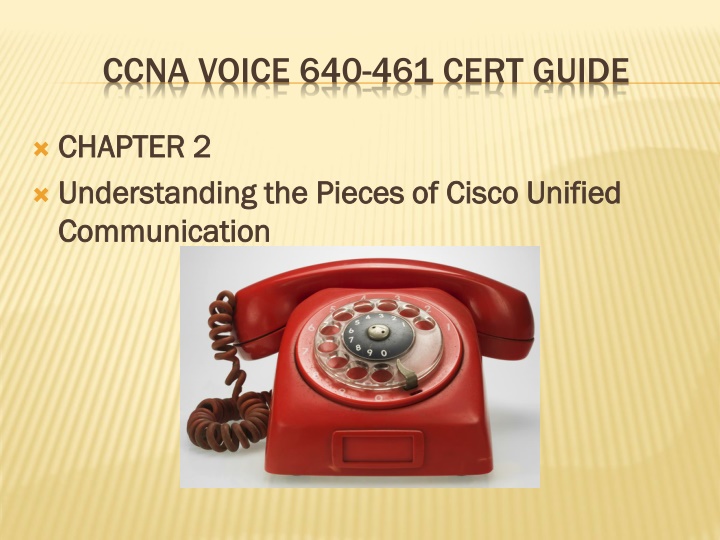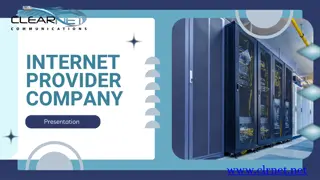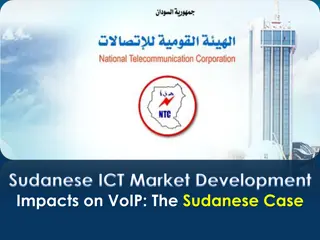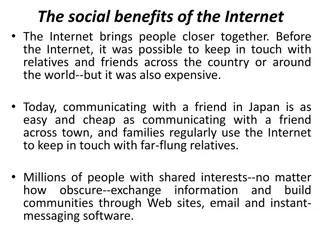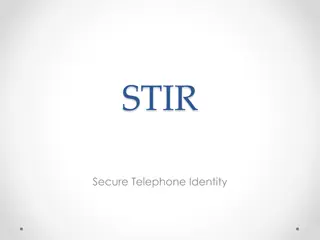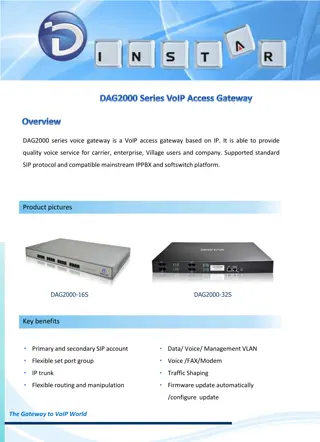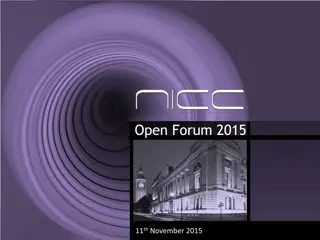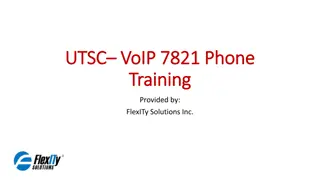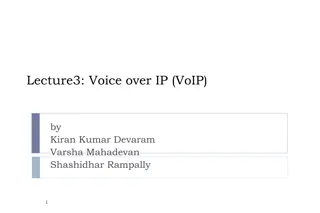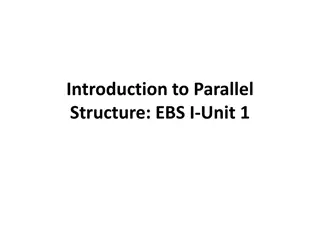Benefits and Structure of VoIP for Business
VoIP offers various benefits for businesses, including cost savings, increased productivity, and feature-rich communication. It allows seamless voice networks, mobility, and integration of data applications with phones. The traditional phone system is likely to be replaced by VoIP. The VoIP structure involves endpoints like phones and video phones, along with applications such as voice mail and call center services, all managed through unified communications managers and infrastructure components like firewalls and routers.
Download Presentation

Please find below an Image/Link to download the presentation.
The content on the website is provided AS IS for your information and personal use only. It may not be sold, licensed, or shared on other websites without obtaining consent from the author.If you encounter any issues during the download, it is possible that the publisher has removed the file from their server.
You are allowed to download the files provided on this website for personal or commercial use, subject to the condition that they are used lawfully. All files are the property of their respective owners.
The content on the website is provided AS IS for your information and personal use only. It may not be sold, licensed, or shared on other websites without obtaining consent from the author.
E N D
Presentation Transcript
CCNA VOICE 640-461 CERT GUIDE CHAPTER 2 CHAPTER 2 Understanding the Pieces of Cisco Unified Understanding the Pieces of Cisco Unified Communication Communication
Benefits of VoIP for Business: Reduced cost of Communicating: Forward calls over WAN links instead of expensive PSTN lines Reduced cost of cabling: Cost cut in half, because of the use of existing Ethernet lines Seamless voice networks: Where there is data networks there can be voice networks Take your phone with you: Because the phone gets configuration by MAC address, the phone can be moved seamlessly IP Softphones: Computer based logical phones that perform all functions of physical phones. (IP Communicator) Unified e-mail, voice mail and fax: All services can be stored and delivered from a single database
Benefits of VoIP for Business continued: Increased productivity: VoIP can forward to multiple devices reducing phone tag Feature-rich communication: Data applications can be integrated with the phone. Open, compatible standards: Different vendors devices can integrate on the same VoIP network
Will the traditional phone system survive? Most believe that it will be replaced by VoIP.
VoIP Structure: Endpoints: Phone, Wireless/Cell Phone, Video Phone, IM Client Applications: Voice mail, Conference Call Applications, Call Center Applications, 911 services Call Processing: Unified Communications Manager, Unified Communications Manager Express, UC500 Infrastructure: ASA Firewall, Voice Router/ Gateway, Voice Switch
Infrastructure Layer: Traditional PBX systems are up 99.999% or down for only five (5) minutes each year! Configured for fast failover Include Quality of service (QoS) in network development Can existing equipment provide service?
Call Processing Layer: Cisco Unified Communications 500 (UC500): Stand alone solution, supports forty-eight (48) users Cisco Unified Communications Manager Express (Call Manager Express CME): Supports up to two-hundred fifty (250) users depending on equipment Cisco Unified Communications Manager Business Edition: Supports up to five-hundred (500) users Cisco Unified Communications Manager (formerly CallManager) Supports thirty-thousand plus users (30,000+)
UC500 Features: Phone support for eight (8) to forty-eight (48) phones Integrated Voice Mail Integrated Automated Attendant Answering System External Music on Hold (MoH) jack to attached external audio source or use WAV file Support for all common phone features Built-in Foreign Exchange Office (FXO) ports for analog PSTN connections
UC500 Features continued: Built-in Foreign Exchange Station (FXS) ports for analog phone / modem / fax connections Built-in Network Address Translation (NAT) and Firewall support for Internet connectivity Built-in Virtual private Network (VPN) support for up to ten (10) users Optional integrated 802.11 wireless network connectivity
Cisco Unified Communications Manager Business Edition continued: Linux based Five-hundred (500) phones supported All-in-one solution Cisco Unified Communications Manager: The call processing component that provides features and functionality Cisco Unity Connection: Integrated Voice-mail solution Cisco Unified Mobility: Allows users to be reached from a single phone number by redirecting calls to multiple devices
Cisco Unified Communications Manager: Added benefits over Business edition- Redundancy Scalability Number of users is thirty-thousand per cluster Multiple cluster support Redundancy support Server based
Application layer: Cisco Unity Express Cisco Unity Connection Cisco Unity
Cisco Unity Express: Smallest Unity Solution Runs from either a Flash Module or Hard Drive Can be added to multiple platforms Flash Advanced Integration Module (AIM) plugs directly into router motherboard Hard Drive runs as a network module Runs as a Linux based program and provides: Voice-mail Automated Attendant Message retrieval via e-mail, phone, or web interface
Cisco Unity Connection: Server solution providing same services as Unity Express With additional dedicated server modules it can scale up to seven-thousand five-hundred (7500) users
Cisco Unity: Additional services of: Forward voice messages as e-mail attachments Users can leave messages for multiple users with a single call Users can listen to e-mail messages using text to speech users can respond to e-mail messages via phone with audio attachment Users can view faxes as TIF files via e-mail
Interactive Voice response / Auto Attendant: Provides Prompt and Collect features Call Redirection
Cisco Unified Contact Center: Can cycle through multiple call agents. Automatic Call Distributor (ACD) Can direct calls to appropriate agents Dedicated server based application Can use Computer Telephony Integration (CTI) Information about caller placed on screen Uses Caller ID Supports Chat Supports Web collaboration e-mail integration
Additional Applications: Cisco Unified Meeting Place: Provides a multimedia conference solution Cisco Unified presence: Provides information of a users availability and reach ability Cisco Unified Mobility: One single contact phone number which links to phone, mobile phone, instant messenger Cisco Emergency Responder: Dynamically updates users position / location to 911 system
Endpoints Layer: Entry-layer phones Single lines Cisco Unified SIP Phone 3911 Cisco 7906G and 7911G Cisco 7931G
Cisco 3911: Inline power support Half-duplex speakerphone Fixed feature buttons
Cisco 7906G and 7911G: Inline power support Onscreen softkey support basic XML service support
Cisco 7931G: Inline power support Built-in switch Onscreen softkey support Basic XML service support
Endpoints Layer: Business-class phones Built-in switch Inline power support Onscreen softkey support XML Service support Full-duplex speakerphone and headset option Cisco 7940G Cisco 7941G Cisco 7941G-GE Cisco 7942G Cisco 7945G
Endpoints Layer: Touchscreen Cisco IP Phones Built-in switch Inline power support Onscreen softkey support XML Service support Full-duplex speakerphone and headset option Cisco 7970G Cisco 7975G Cisco 7971G-GE
Endpoints Layer: Specialty Devices Built-in switch Inline power support Onscreen softkey support XML Service support Full-duplex speakerphone and headset option Video Camera Video Display Cisco 7985G
Endpoints Layer: Specialty Devices XML Service support Full-duplex speakerphone Wireless Supports 802.11 a,b and g Cisco 7921G
Endpoints Layer: Specialty Devices External microphone attachment Full-duplex speakerphone Cisco 7937G
Endpoints Layer: Specialty Devices ATA 186/188: Converts up to two (2) analog phones to VoIP devices Cisco IP Communicator: IP Softphone computer based Cisco VT Advantage: Integrates webcam with the VoIP Phone Cisco 7914/7915/7916 expansion module: Expands each phone by fifteen (15) lines
